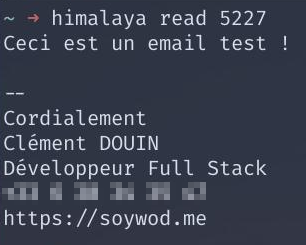Minimalist CLI email client, written in Rust.
Bringing emails to the terminal is a pain. The mainstream TUI, (neo)mutt, takes time to configure. The default mapping is not intuitive when coming from the Vim environment. It is even scary to use at the beginning, since you are dealing with sensitive data!
The aim of Himalaya is to extract the email logic into a simple (yet solid) CLI API that can be used either directly from the terminal or UIs. It gives users more flexibility.
curl -sSL https://raw.githubusercontent.com/soywod/himalaya/master/install.sh | bashSee the wiki section for other installation methods.
# ~/.config/himalaya/config.toml
name = "Your full name"
downloads-dir = "/abs/path/to/downloads"
[gmail]
default = true
email = "[email protected]"
imap-host = "imap.gmail.com"
imap-port = 993
imap-login = "[email protected]"
imap-passwd-cmd = "pass show gmail"
smtp-host = "smtp.gmail.com"
smtp-port = 487
smtp-login = "[email protected]"
smtp-passwd-cmd = "security find-internet-password -gs gmail -w"See the wiki section for all the options.
Himalaya 0.2.0
soywod <[email protected]>
📫 Minimalist CLI email client
USAGE:
himalaya [OPTIONS] [SUBCOMMAND]
FLAGS:
-h, --help Prints help information
-V, --version Prints version information
OPTIONS:
-a, --account <STRING> Name of the account to use
-o, --output <STRING> Format of the output to print [possible values: text, json]
SUBCOMMANDS:
attachments Downloads all attachments from an email
forward Forwards an email
help Prints this message or the help of the given subcommand(s)
idle Starts the idle mode
list Lists emails sorted by arrival date
mailboxes Lists all available mailboxes
read Reads text bodies of an email
reply Answers to an email
save Saves a raw message in the given mailbox
search Lists emails matching the given IMAP query
send Sends a raw message
template Generates a message template
write Writes a new email
See the wiki section for more information about commands.
Shows mailboxes in a basic table.
Shows messages in a basic table.
Shows filtered messages in a basic table. The query should follow the RFC-3501.
Downloads all attachments from a message directly to the
downloads-dir.
Shows the text content of a message (text/plain if exists, otherwise
text/html).
himalaya writeOpens your default editor (from the $EDITOR environment variable) to compose
a new message.
himalaya reply --all 5123Opens your default editor to reply to a message.
himalaya forward 5123Opens your default editor to forward a message.
himalaya idleStarts a session in idle mode (blocking). When a new message arrives, it runs
the command notify-cmd defined in the config
file.
Here a use case with systemd:
# ~/.config/systemd/user/himalaya.service
[Unit]
Description=Himalaya new messages notifier
[Service]
ExecStart=/usr/local/bin/himalaya idle
Restart=always
RestartSec=5
[Install]
WantedBy=multi-user.targetsystemctl --user enable himalaya.service
systemctl --user start himalaya.service- IMAP RFC3501
- Iris, the himalaya predecessor
- isync, an email synchronizer for offline usage
- NeoMutt, an email terminal user interface
- Alpine, an other email terminal user interface
- mutt-wizard, a tool over NeoMutt and isync
- rust-imap, a rust IMAP lib




